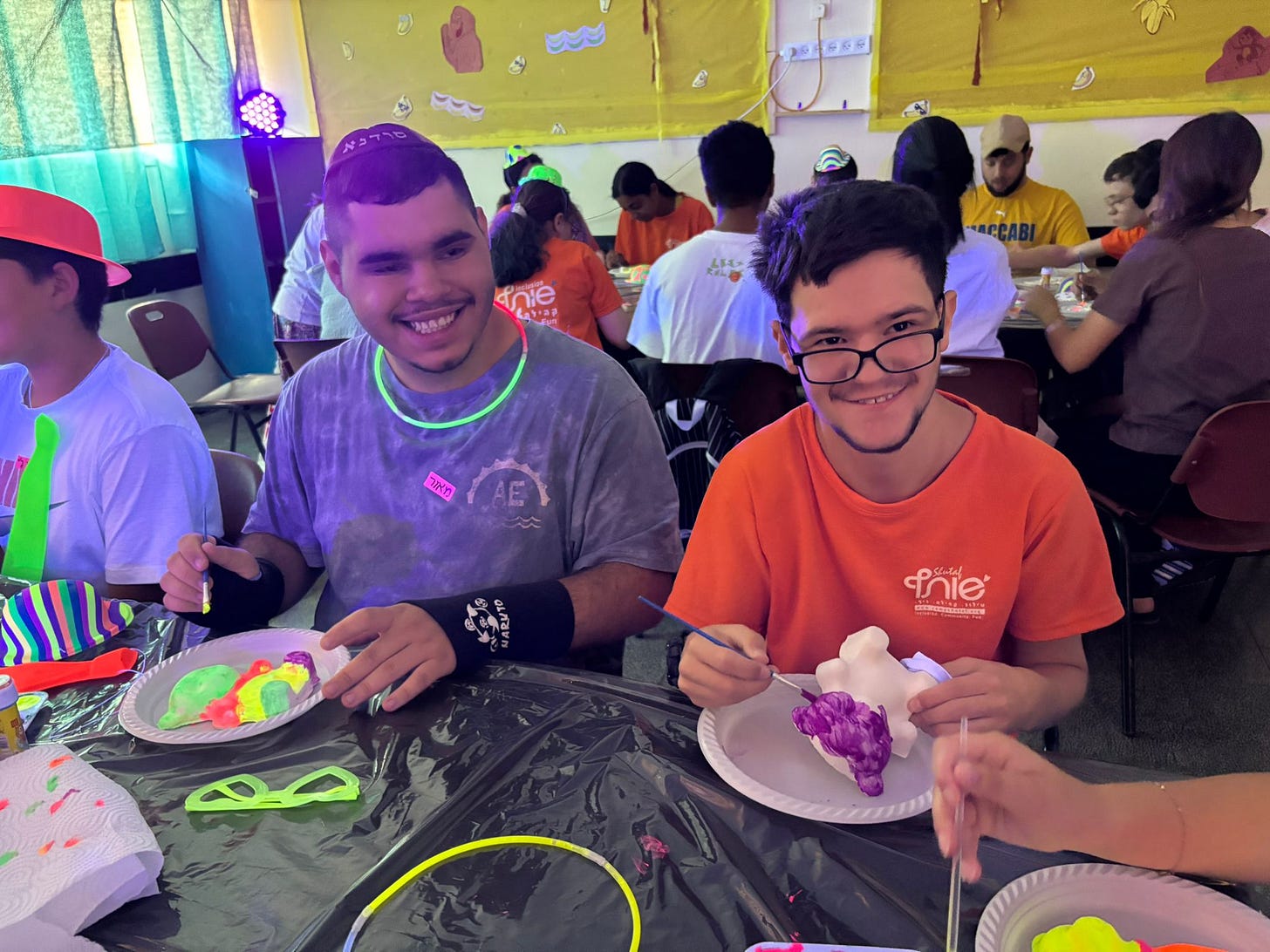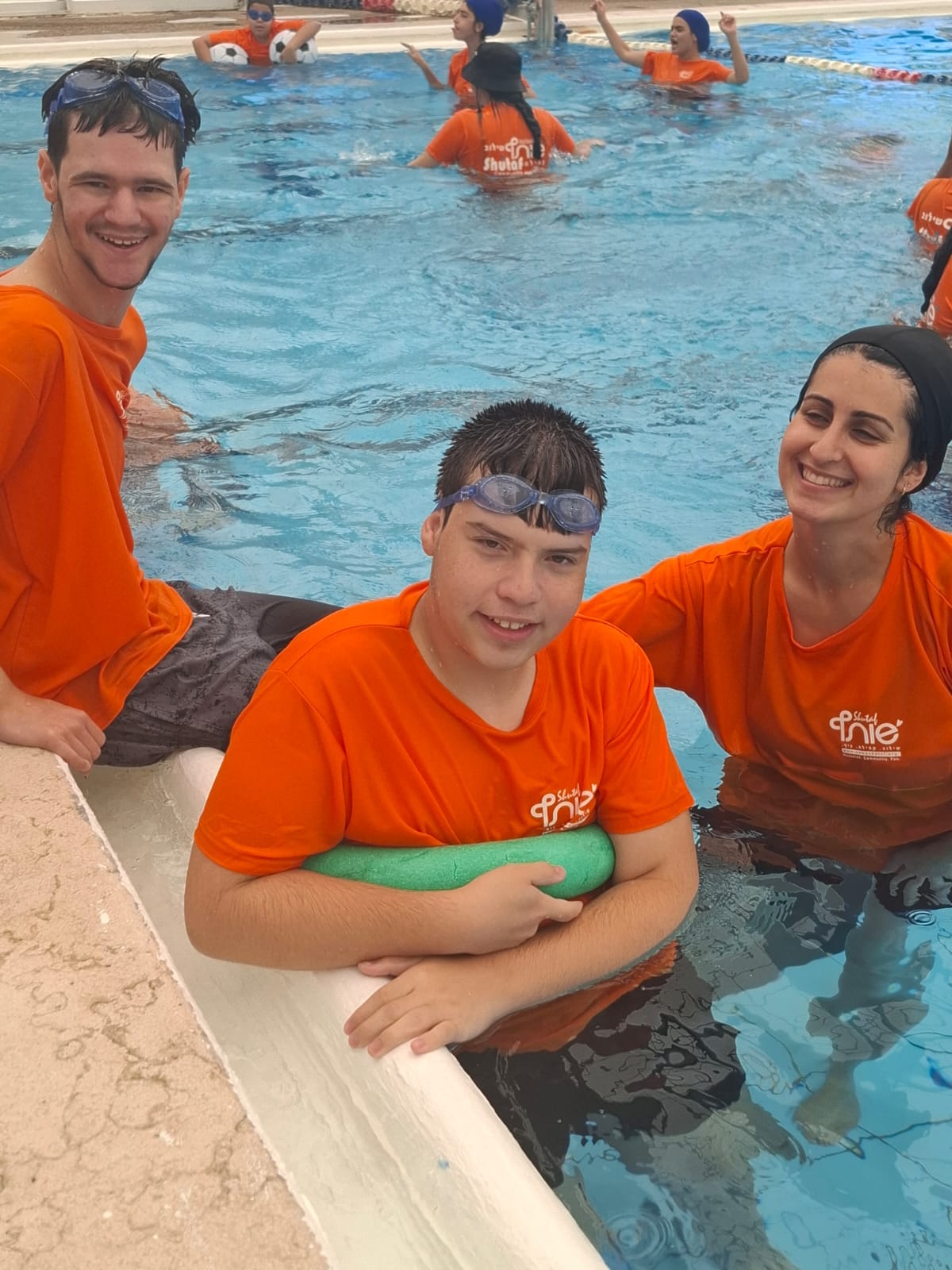Disagreeing Respectfully. Can We?
Thinking compassionately about the world
Our job, as my brother described it the other day, is to work and live our lives and find our steady. This was after we argued and disagreed about the government’s decision regarding Gaza. I wanted him to get all bent out of shape, defend his position and duke out our political differences but he avoided dissent and remained calm.
So unusual for a Steinberg. We tend towards the argumentative, something I still grapple with in adulthood.
A longtime real estate broker and developer, located in Tel Aviv, brother Jon said that he counsels his brokers, especially when they’re upset that maybe they said the wrong thing when working with clients, that there are many things you’ll say to clients over the months you work together in advance of closing some kind of deal. The most important thing? Being professional and polite, and not worrying too much about those times that you didn’t put your best foot forward or say exactly the right thing.
I thought a lot about our conversation over Shabbat, and texted him on Sunday in order to tell him how much I appreciated his calmness, especially when I was fixing for a fight as well as telling him that he was wrong. Responding, he wrote, “We don't have all the information, or the responsibility to decide, but we still need to figure out what's right from our perspective.”
And he’s right. (As hard as that is to admit it!)
Thankfully, I had visitors to Camp Shutaf on Sunday. Starting off the week with a camp visit is a balm to the senses. Seeing happy kids with diverse needs and disabilities hanging out and having fun, or perhaps joining an activity means I could focus in on being a caring and inclusive-minded community, something that means a lot to me, as opposed to politics and all that makes so many of us deeply unhappy of late.
This is Camp Shutaf’s 19th summer! Pretty unbelievable. For those of you who don’t know how Shutaf Inclusion Programs got started, I’ll tell you in brief. I moved to Israel in 2006, moments after the Gaza disengagement - but let’s not go there - and meeting up with a few moms the following May 2007, I asked what people do for their kids, those with disabilities in particular (my youngest, Akiva was 9), during the long summer vacation.
“We struggle!” and “It’s really hard,” was the answer I received. Actually, I remember Miriam, my friend and co-founder saying, “It’s a catastrophe,” but she says it didn’t play out that way. Funny how our memory works.
That’s when I learned how little there was in Israel during the summer, and how little quality, informal education was respected as an important part of a kid’s life, let alone its necessity for working parents. That’s for kids with and without disabilities. (It wasn’t the Garden of Eden back in Brooklyn - I know that bothers people who feel that it’s all better in the US but we didn’t experience it quite that way for Akiva.)
Remember that I’m a little argumentative? I went to day camp every summer, finally making it to sleepaway camp as a 12-year old. Being away for the summer, let alone during a time where being in touch was only by snail mail, was an eye opening and fantastic reprieve from my increasingly tough relationship with my parents, especially my mother. My mother and I, two-peas-in-a-pod really in terms of inability to see the the grey in life’s situations (much more Rosenshein, my mother’s family, than Steinberg, my father’s family), only ‘agreed to disagree’ much later in my adulthood.
My years at camp continued through college, from camper to counselor. Camp was what I waited for each year, where I really developed as a human being without worrying about my parents and what they knew or didn’t know. There were no online website to crawl through each day looking for pictures, or email reports. What did they know what I was doing really? They sort of thought they knew, and that was the best part of it. Imagine that? (Looking online, even the most “screen free camps” are still taking pics but maybe only posting 1x weekly. Obviously, pictures were taken at camp even in the 70’s but we only saw them when the camp yearbook was published.)
In any case, Shutaf Inclusion Programs began in 2007 with 10 children, with and without disabilities. This year we’ve got 93 campers, ages 6-21, having a fabulous 3 weeks together. That’s big, btw, by Israeli standards for a day camp, and bigger than many special education schools locally. And Shutaf isn’t just camp. During the year, our programs focus on teens and young adults with diverse needs and disabilities. We also teach and share resources for best practices - take a look here - for supporting staff and participant needs. Email me - beth@campshutaf.org - to find out more.
This year, camp is at a new location in Givat Mordechai, centrally located near Jerusalem’s Gazelle Park, and not far from Shutaf’s new future home on the Givat Ram campus of Hebrew University. (I’ll tell you about that project another day!)
Walking around with my visitors, we grinned at kids of all ages having a great time; blowing bubbles and getting wet (much needed on a hot day), doing woodworking with the wonderful Raphael, who tells me he’s been working at Shutaf for at least 15 years. Raphael is amazing at creating stuff out of whatever he has on hand. Years ago, with a plastic fork, a straw, some tape and a pencil I think, the kids made this fabulous moving bird like structure which we kept around the house and played with for years! He’s also the kid whisperer, able to get the most afraid-to-engage, or hates-to-join-in type of camper to pick up some supplies and get involved. (We’re process-based at Shutaf, and not about the end product to bring home for parents to admire.)
Then we walked outside to watch Etgarim - they do specialty sports for people with disabilities - set up a climbing area between two trees. The kids harnessed up safely, and waiting their turn, climbed up and walked on this tightrope kind of thing between the trees. Everyone was so encouraging of each other, especially those who needed a little extra push to try what seemed kind of scary. (I would never do it!)
Given that it was a new week, there was the usual stuff as kids return to camp after 2-days off. For some kids, the transition back into camp isn’t easy - socially or emotionally - and as always, we have kids who react physically when stressed and who struggle to find the language they need to explain why they don’t feel comfortable.
One kid was having a really hard day, complete with turning over tables and chairs. He was in an empty classroom with a staffer who was ‘helping him turn over the chairs and tables,’ much to his surprise. Eventually, as will happen with big emotional moments, he wore himself out. Calmly, he looked around the classroom and began to tidy up, preparing the space for the rest of the group to join him for lunch. Needing a steadying conversation with his mother, he had a quick phone call, and then took Monday off before returning to camp on Tuesday. Marci, Shutaf’s longtime Director of Programs, also had a calm follow-up conversation with his parent’s in under to understand what went wrong - had anything happened over the weekend that would help us undertand - and did they have any tips for moments like this that could happen in the future.
Sometimes, a child doesn’t return to camp. Maybe we’re not the right place for them this summer. During our extensive intake process, and when we meet families and children, our aim is to get to know them as much as best as we can so we can meet their needs successfully on Day 1. Occasionally, it’s just not a good fit, or we feel that we can’t keep them (and their participant group) safe and happy.
It’s camp. Campers should want to come and take part. Maybe they’re telling us, and their parents, ‘I just don’t want to be here.’ For working families, that can be a message they don’t want to hear but especially with our teens, ages 14-21, we want them to choose to attend camp or our year-program.
Choice matters, and is too often overlooked when it comes to serving people with disabilities, or children in general.
When a different camper took a day off, his camper group initiated a thoughtful conversation about his needs, as well as how could they help him have a better and more successful camper experience. The staff shared ideas. Everyone felt a little bit better, especially when he came back the next day with a smile but didn’t continue through the end of the 2nd week. It just wasn’t working for him this year.
Serving a camper population with truly diverse needs isn’t about pretending there aren’t challenges, its about meeting them head on, with thoughtful problem solving, staff support and training, and a commitment to building an inclusive community that respects each other’s differences.
Kind of like the world around us. How do we inform ourselves about those ideas that seem important to us, then following up that education process with joining onto a project that helps make some change. That might help many people find a way beyond the face value of appearing to care about the cause célèbre of today without the work. I don’t mean this meanly - it’s easier to talk-the-talk of course. Sort of makes me think of climate activist, Greta Thunberg and how she encapsulates the limited way she has chosen to view some of the world’s challenges and inhumanities.
wrote about Greta today…“Yes, I’m glad she’s alive and well — truly. I was starting to wonder, since she went utterly silent during the massacre of the Druze in southern Syria. Apparently, some human rights violations just don’t trend as well.Yes, she’s young. Yes, she’s passionate. And yes, she’s not wrong — there is a humanitarian crisis in Gaza.
But Greta, for all her moral fury, somehow always manages to miss the mark.
And by now, I’m pretty sure it’s deliberate.
She doesn’t mention the hostages. She says nothing about the men, women, and children — babies, elderly — suffocating in Hamas’ terror tunnels right now. Nothing about the sexual violence, the murders, the massacres that got us here in the first place. Nothing about the 1,200 people who were slaughtered in their homes, in their beds, in their cars, at a music festival…”
Sarah sums it up well. “We live in a world that claims “nothing is binary,” and yet Greta has made it binary: the only victims she acknowledges are in Gaza, and the only villains she names are Israelis. That’s not nuance. That’s propaganda and jew hatred dressed up as compassion.”
To me, thinking compassionately means ending the war.
To me, thinking compassionately means bringing home all hostages to Israel.
To me, thinking compassionately means committing to finding a path forward towards equal rights for Israeli-Arab citizenry and for Palestinians in West Bank communities.
To me, thinking compassionately means honoring all those lost and the affect on their families and extended communities.
To me, thinking compassionately means rebuilding homes in Israel lost to bombs, Iran, Hezbollah, and Hamas.
To me, thinking compassionately means working with those partners committed to peace in the region so that Gazans can rebuild their cities and their lives, and not their tunnels and terror infrastructure.
To me, thinking compassionately means doing the work because it sure won’t be easy, and it’s far from binary.
#BringThemHomeNow
#EndTheWar
#PeaceNow







Great essay!